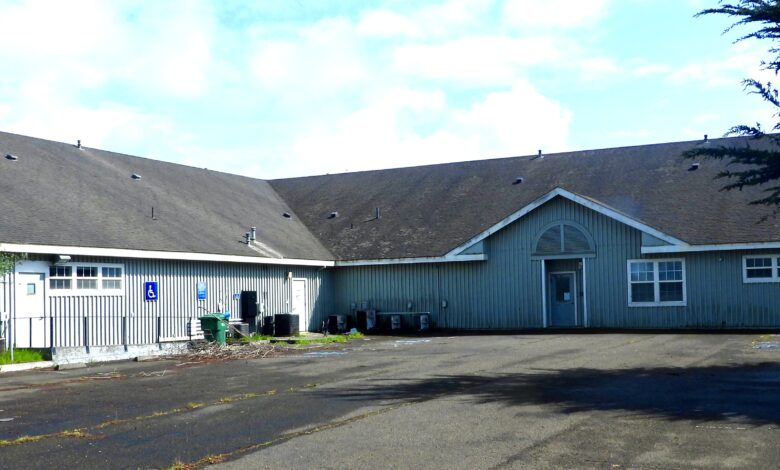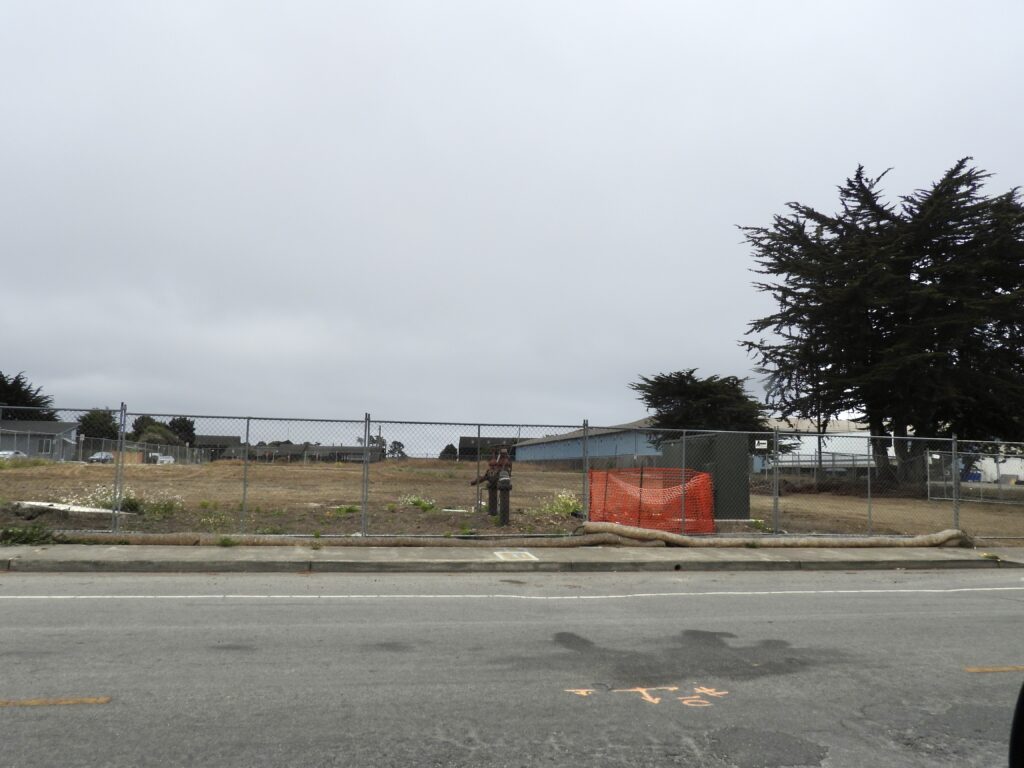UPDATE—Grocery Outlet confirms it still plans to open in Fort Bragg but no opening date set. Fort Bragg was not on the list of 28 unopened stores that recently had their leases canceled.

Editor’s Note- Fort Bragg’s Grocery Outlet is still coming to Fort Bragg, although the company does not yet have a proposed opening date. We were able to confirm this Thursday afternoon through the company. We were not able to get anyone to say this by name, but it comes from the top management.
Grocery Outlet had a difficult 2024 but has a new plan going forward that the company expects to make it more resilient. That’s all we have. Still no word on which 28 unopened stores had their leases canceled.
Here is the story from Wednesday—-
With grocery prices rising and profits and profit margins shrinking, discount chains are having to become leaner and more efficient
Grocery Outlet, once expanding rapidly – has now pulled back – terminating 28 store leases and scaling down new builds as part of its’s late 2024 restructuring.
The latest filings with the Securities and Exchange Commission said the company is terminating 28 leases for unopened stores in what they have defined as “suboptimal locations.”
And there is more. The company also announced “the discontinued development of certain future store sites where we had incurred initial costs, but leases had not yet been signed.
Any major changes – good, bad or impactful – in a company doing business on the Mendocino coast is news to us. Grocery Outlet cuts are no exception, such as the Safeway Strike that never happened that we reported on. What happens to companies that are part of the Mendocino Coast gets coverage here.
In addition to stopping construction on an unknown number of stores and never opening the 28, the restructuring also includes “the cancellation of certain capital-intensive warehouse projects and a reduction in headcount in building a more scalable cost structure” (staff reductions apparently).
Grocery Outlet had a rough 2024 but things are looking up in 2025.
“2024 was a year in which many critical operational elements were out of sync, which was further exacerbated by trying to do too much, too fast. But we’re working urgently to get back on track,” Grocery Outlet Chairman Eric Lindberg told United Grocery News in February.

The company’s financial statements said its profit margins are going down due to its seeking lower price points in a time of rising prices. That hit hard in the first quarter, from January-March for the company, the filings state. Grocery Outlet reacted by improving its inventory management capabilities, stockholders heard in an investors call and it was reported in SEC files.
That brought a bounce back in the quarter that ended in June:
“We opened 11 new stores and closed two stores, ending the quarter with 552 stores in 16 states. Starting in the second quarter of fiscal 2025, comparable store sales include the addition of stores from the acquisition of United Grocery Outlet on April 1, 2024,” the SEC filing said.
More than half of all Grocery Outlet Stores are in California. The company is based in Emeryville.
There is a new Grocery Outlet opening in Chico on Thursday this week and another opening in Fulton-Sacramento the same day. No details have been released yet about the 28 leased but unopened stores. Mendocinocoast.news is monitoring the situation closely. If you’ve heard rumblings in nearby towns. We’ love to hear from you. Reach us direct at frankhartzell@gmail.com
After 36 years of operation the Rancho Cordova store terminated it’s lease and closed the doors.
Grocery Outlet emerged from early beginnings as an Army surplus store launched after World War II that became a hit and expanded. The company practices much of the fiscal conservative business practices, auction acquisitions and commitment to a “local” individual partner.
Grocery Outlet emerged from early beginnings as an Army surplus store launched after World War II that became a hit and expanded. The company practices much of the fiscal conservative business practices, auction acquisitions and commitment to a “local” individual partner. Grocery Outlet is different from chains like Albertson’s ( The company that owns Safeway) in that it shares ownership with an individual operator. A partner was sought locally on the Coast, but the company settled on a man from the Bay Area whose father-in-law is currently an independent operator for the Grocery Outlet chain.
Mendocinocoast. news staff have met the new owner-operators but they have not been formally announced as new owners by the company. If Fort Bragg’s store survives the company’s new effort to cut “suboptimal” locations that it once had approved, that information will be released in time; we aren’t here to steal their thunder.
Examples of their fiscal conservatism is that the company prepares fully for the launch of a store by meeting all challenges ahead of time. For example, the company did more environmental work than was needed for the proposed location at the south end of Franklin Street in Fort Bragg. They didn’t have to do that. And GO was not actually “stopped” by opponents who objected or even filed suit.. They choose to do their business in a conservative way that allows the co-owner partner to have a clean slate when the store opens. Many chains just plow forward despite lawsuits and even local government challenges.
Grocery Outlet’s SEC filings also include two interesting lawsuits, brought by stock buyers in one case and between former top executives and a member of the board of directors. While all retailers face lawsuits from customers or suppliers, these were the only ones in 2025 that merited mention in the quarterly report GO filed with the SEC
“Except as disclosed below, management believes that we do not have any pending legal proceedings that, separately or in the aggregate, would have a material adverse effect on our results of operations, financial condition or cash flows.”
•On January 30, 2025, a federal securities class action lawsuit, captioned Liberato v. Grocery Outlet Holding Corp., et al., Case No. 25-cv-00957, was filed in the United States District Court in the Northern District of California against Grocery Outlet Holding Corp. and certain of its former officers purportedly on behalf of purchasers of our common stock between November 7, 2023 and May 7, 2024 (the “Liberato Lawsuit”).
•On March 28, 2025, a second and related federal securities class action lawsuit, captioned Cavanaugh v. Grocery Outlet Holding Corp., et al., Case No. 25-cv-2886, was filed in the United States District Court in the Northern District of California against the same defendants on behalf of purchasers of our common stock between August 8, 2023 and October 29, 2024 (the “Cavanaugh Lawsuit,” and together with the Liberato Lawsuit, the “Class Action Lawsuits”). The Class Action Lawsuits allege that the defendants violated federal securities laws by making materially false and misleading statements and/or failing to disclose material adverse facts regarding our transition to new and upgraded internal systems. The Class Action Lawsuits seek remedies under the Securities Exchange Act of 1934, as amended (the “Exchange Act”), including an undisclosed amount of monetary damages, interest, fees and other costs.
•On March 31, 2025, the plaintiff who filed the Cavanaugh Lawsuit filed a motion to consolidate both actions and to be appointed as lead plaintiff.
•On June 3, 2025, the Class Action Lawsuits were consolidated in the United States District Court in the Northern District of California (the “Consolidated Class Action Lawsuit”). The lead plaintiff’s amended complaint in the Consolidated Class Action Lawsuit is due August 19, 2025, and the Company’s motion to dismiss is due October 21, 2025.
•On April 28, 2025, a federal stockholder derivative lawsuit, captioned Conners v. Sheedy, et al., Case No. 25-cv-03697, was filed in the United States District Court in the Northern District of California against certain of the Company’s directors and two of its former officers purportedly on behalf of the Company.
On May 2, 2025, a second federal stockholder derivative lawsuit, captioned Jackson v. Lindberg, et. al., Case No. 25-cv-03843, was filed in the United States District Court in the Northern District of California against certain of the Company’s directors and two of its former officers purportedly on behalf of the Company. These stockholder derivative lawsuits are collectively referred to as the “Derivative Lawsuits.” The Derivative Lawsuits allege claims for breach of fiduciary duty, unjust enrichment, abuse of control, gross mismanagement, waste of corporate assets and for violations of Sections 10(b), 14(a), and 20(a) of the Exchange Act, based on similar allegations to those at issue in the Class Action Lawsuits. The Derivative Lawsuits seek, among other relief, undisclosed damages, restitution, fees and other costs, and the institution of corporate governance reforms.

On July 14, 2025, the parties in the Derivative Lawsuits stipulated to consolidate the Derivative Lawsuits in the United States District Court in the Northern District of California and stay the consolidated Derivative Lawsuits pending resolution of the Company’s motion to dismiss in the Consolidated Class Action Lawsuit discussed above. On July 29, 2025, the court granted the parties’ stipulation, consolidating the Derivatives Lawsuits and staying the consolidated derivative action.
We are interested in whether the store will open here and if this is the last round of cuts of proposed locations. Stay tuned
